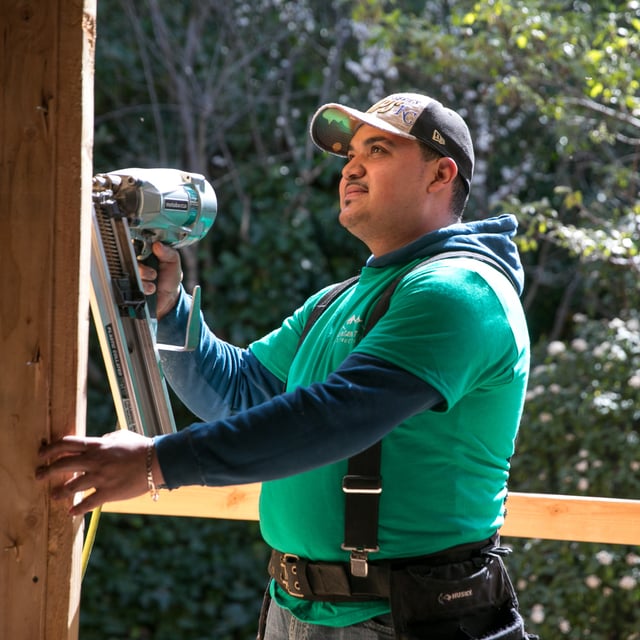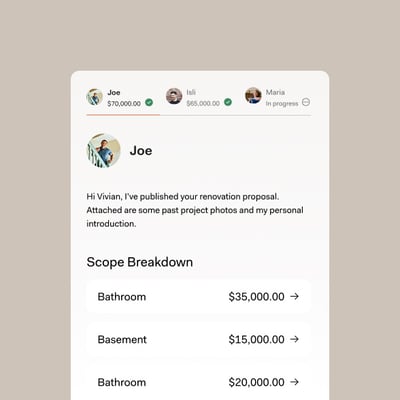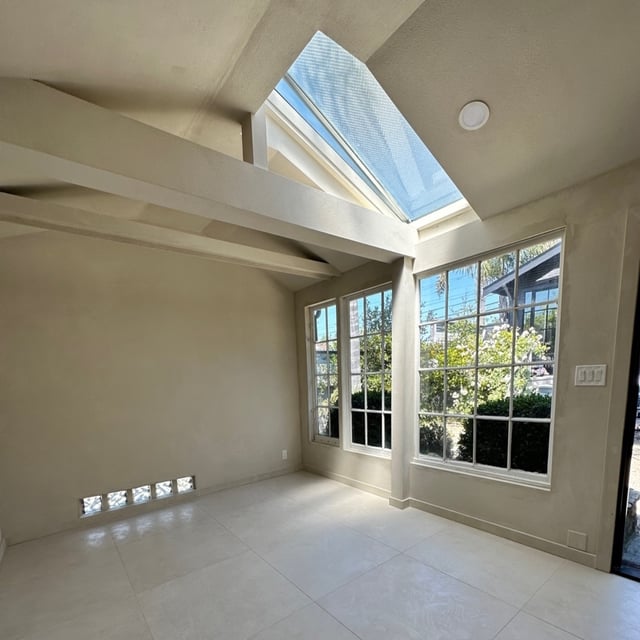
Contractors
How to Find a Home Addition Contractor
04.25.2025

In This Article
Choosing the right home addition contractor is crucial for a successful renovation project. Many homeowners face challenges like unexpected costs and unreliable contractors, which can make the process daunting.
This guide aims to help you find a reliable contractor, ensuring a smooth and stress-free home addition. We'll explore everything from assessing your needs to managing the construction process. So, let's get started on the journey to create your dream home!
Design a Home That’s Uniquely Yours
Block can help you achieve your renovation goals and bring your dream remodel to life with price assurance and expert support.
Get Started
Before diving into your home addition project, it's essential to clearly define your needs and what you aim to achieve. Whether you're dreaming of an extra bedroom, a sunroom, or even a second story, understanding the scope of your project can help you hire a home renovation and additional contractor that suits your requirements. Additionally, considering factors like budget and permits will pave the way for a smoother process with the best home addition contractors.
Defining your project scope is the first big step in planning your home addition. Begin by identifying exactly what you want to add—such as an extra bedroom, a lovely sunroom, or a whole new second story. Having a clear idea not only helps you communicate better with home renovation and addition contractors but also guides you in finding a reliable contractor who specializes in your specific needs.
When planning a home addition, setting a realistic budget is key to avoiding financial surprises. Start by estimating the home addition cost, taking into account everything from materials to labor. Consulting home addition contractor reviews can give insight into typical costs. Also, explore financing options like home equity loans or personal loans to see what fits your situation best. Knowing your financial limits will help when you hire a contractor for home addition projects.
Navigating permits and zoning regulations is a crucial part of the home addition process. Before starting, find out what permits are required in your area, which could vary based on what you're adding. Each home renovation and addition project might need different permits, so consulting your local city or county zoning office is wise. By understanding these requirements ahead of time, you ensure a smoother, compliant project with licensed home addition contractors.
Finding a reliable home addition contractor can feel overwhelming, but there are several great places to start your search. Online directories and contractor matching services can connect you with some of the best home addition contractors in your area. These platforms often include reviews and ratings, helping you hire a contractor for a home addition with confidence. Additionally, talking to friends, family, and neighbors can provide personal recommendations. They might have firsthand experiences that guide you to trustworthy licensed home addition contractors.
Another effective way to find a home renovation and addition contractor is by visiting local building supply stores and showrooms. Professionals at these places often work with contractors and can recommend reliable ones. For a more streamlined solution, consider using Block Renovation’s platform. Block offers an empowering tool, allowing you to match with contractors based on your project needs, budget, and timeline. Don't forget to start the quiz on our site to find a contractor who perfectly fits your project criteria.
Turn your renovation vision into reality
Get matched with trusted contractors and start your renovation today!
Find a Contractor
Once you’ve identified potential home addition contractors, the next step is to vet them thoroughly to ensure they’re the best fit for your project. Begin by checking licenses, certifications, and insurance to verify they are legitimate and reliable contractors. Licensed home addition contractors offer an assurance of quality and adherence to local regulations. This step is crucial in ensuring that you are working with someone qualified and protected against any mishaps.
Next, review their portfolios and past projects to assess their work style and quality. Looking at home addition contractor reviews can also provide insights into the experiences of previous clients. Additionally, reading customer reviews and testimonials can reveal how well the contractor meets expectations and handles project challenges. Finally, conducting background checks through platforms like the Better Business Bureau (BBB) and state licensing boards can give you a comprehensive view of their record and reliability. These steps help you feel confident in your choice when hiring a contractor for your home addition.
Getting and comparing bids is an essential part of ensuring you hire the best home addition contractor near you. Start by requesting detailed estimates from potential contractors. A comprehensive estimate should break down labor, material, and overhead costs, giving you a clear picture of what each home addition will entail. This transparency helps you understand where your money is going and allows for effective comparison between different contractors.
When reviewing bids, be cautious of those that are unusually low or exceedingly high. Extremely low bids might indicate cut corners or hidden costs, while high ones could be a sign of inflated pricing. Understanding the typical home addition cost estimate for your area can guide you in identifying fair pricing. As you compare, consider using negotiation tips to discuss costs and timelines with contractors. Keep an eye out for red flags like vague contract terms or unwillingness to detail expenses. By following these steps, you’re more likely to find a reliable contractor who fits your budget and needs.
Before making your final decision on a home addition contractor, it's important to ask the right questions to ensure they're the right fit for your project. Here are some key questions to consider:
Compare Proposals with Ease

Signing the contract is a crucial step in solidifying your agreement with a home addition contractor. A solid contract should clearly outline key elements, such as the scope of work, project timeline, and materials to be used. It is essential for both parties to have a shared understanding of what the home addition will entail, reducing the risk of misunderstandings down the road. Additionally, ensure the contract includes detailed payment schedules and deposit requirements. This provides clarity on when payments are due in relation to project milestones, helping to manage the financial aspect of the project smoothly.
Furthermore, the contract should address the change order process and dispute resolution mechanisms. The change order process is vital, as it outlines how modifications to the original plan will be handled, including any associated costs. This ensures that any changes are managed systematically, keeping the home renovation and addition project on track.
Managing the construction process effectively is key to a successful home addition. Start by setting clear expectations and establishing a communication plan with your contractor. Regular updates and easy communication channels ensure everyone stays on the same page, and potential issues are addressed promptly. This proactive approach helps you keep the project on schedule and avoids misunderstandings that could disrupt the workflow.
As the project progresses, tracking progress is crucial. Regular check-ins help you monitor the work against the timeline and allow for early identification of any unexpected issues. Addressing these promptly can prevent small problems from escalating into larger ones, ensuring the home addition stays within scope and budget. Additionally, it’s important to ensure that the worksite remains safe and clean. A well-maintained worksite not only reduces the risk of accidents but also reflects the contractor’s professionalism and attention to detail. By focusing on these aspects, you create a positive environment that leads to a successful and satisfying outcome.
As your home addition project nears completion, conducting a thorough walkthrough with your contractor becomes essential. This step allows you to inspect the finished work closely and ensure it aligns with your expectations and the contract details. During this walkthrough, create a punch list of any items that need further attention or correction. Addressing these punch list items promptly ensures that the final touches are made and the project meets your satisfaction.
Once you’ve confirmed that all work is complete and up to standard, make sure to get any necessary certifications and permits signed off. This step is crucial in ensuring that your home addition complies with local building codes and regulations, providing peace of mind and legal assurance. Following this, you can proceed with the final payment to your contractor. Don't forget to leave a contractor review, as this not only helps them but also assists other homeowners in finding a reliable contractor for their home renovation and addition needs. Celebrating this milestone marks the end of your project and the beginning of enjoying your newly enhanced home space.
In conclusion, finding a reliable contractor for your home addition involves careful planning and thorough vetting. By understanding your project scope, budget, and necessary permits, you set a strong foundation for success. Always conduct due diligence by checking licenses, reading home addition contractor reviews, and comparing bids, as patience and meticulousness can save you from future headaches.
After your project is complete, enjoy your new space and consider sharing your experience to help others find the best home addition contractors near them. As you take these steps, remember that a well-executed home renovation and addition adds value and comfort to your home.
How can I verify if a home addition contractor is licensed and insured?
What should be included in a home addition contract?
How long does a typical home addition project take?
What are common red flags when hiring a contractor?
How much should I budget for a home addition?

Renovate confidently with Block
Easily compare quotes from top quality contractors, and get peace of mind with warranty & price protections.
Thousands of homeowners have renovated with Block

4.5 Stars (100+)

4.7 Stars (100+)

4.5 Stars (75+)

Contractors
How to Find a Home Addition Contractor
04.25.2025

Contractors
Ultimate Guide to Bathroom Remodel Financing in 2025
03.13.2025

Cost
How Much Does a 20x20 Room Addition Cost?
03.05.2025

Contractors
What is an Alteration Agreement for Buildings in New York City, and How to Read One?
01.27.2025

Process
What is an ADU? The Complete ADU Construction Guide
01.14.2025
Renovate confidently